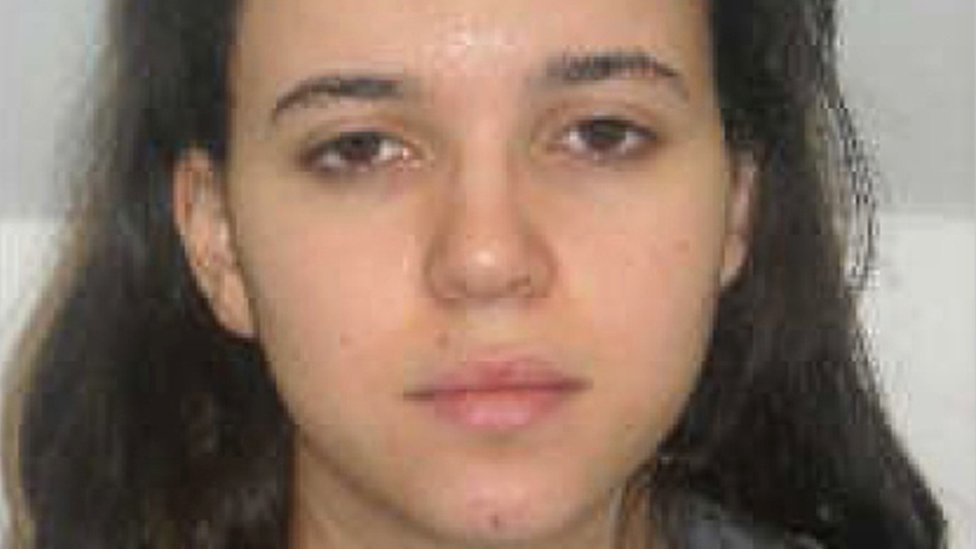 image copyrightEPA
image copyrightEPAA survivor of the Charlie Hebdo killings has told a French court of the trauma she has suffered since she was forced at gunpoint to let two attackers into the magazine’s offices.
Cartoonist Corinne Rey gave emotional testimony at the trial of 14 people accused of helping the two attackers.
The militant Islamists shot dead 12 people in and around Charlie Hebdo’s Paris office in January 2015.
Five more were killed by a third gunman in related attacks.
The 17 victims were killed over a period of three days. All three attackers were killed by police. The killings marked the beginning of a wave of jihadist attacks across France that left more than 250 people dead.
In the days following the 2015 attacks, millions of people took part in solidarity marches across France and around the world under the slogan “Je suis Charlie” (I am Charlie).
The magazine marked the start of the trial by reprinting controversial cartoons of the Prophet Muhammad that had sparked protests in several Muslim countries.
What was the cartoonist’s testimony?
Ms Rey, 38, had tears in her eyes on Tuesday as she recalled the moment she was confronted by the attackers, Cherif and Said Kouachi, at Charlie Hebdo’s offices on 7 January 2015.
The cartoonist had left the magazine’s weekly editorial meeting early to go downstairs for a smoke when she encountered the gunmen at the door.
Brandishing assault rifles, the gunmen called her by her pen name, “Coco”, and said “we want Charlie Hebdo”, Ms Rey told the court.
Threatening to kill her, the gunmen forced her to escort them to the magazine’s second-floor offices, telling her: “You have insulted the prophet, we are al-Qaida Yemen.”
The attackers targeted Charlie Hebdo because they believed the magazine had blasphemed against Islam by publishing caricatures of the Prophet Muhammad.
At the top of the stairs, the attackers ordered Ms Rey to tap in the entry code for the office as they pointed their weapons at her.
“I had a sense of dread,” Ms Rey said in court, appearing visibly emotional. “I was in distress, I could not think anymore.”
“I was devastated, as if dispossessed of myself, I could no longer do anything. I moved towards the code keypad and I typed it in,” she recalled. “I felt that the terrorists were approaching their goal, I felt them growing excited next to me.”
What happened during the attack?
Inside the office, Said and Cherif Kouachi opened fire on the magazine’s staff.
Simon Fieschi, the administrator of the weekly’s website, was the first to be shot. Meanwhile, Ms Rey said she ran to hide under a desk.
“After the shots, there was silence, a silence of death… I thought they were going to finish off the job with all the ones they hadn’t killed,” Ms Rey said.
In less than two minutes, the shooting spree was over. The attackers left, leaving behind a vision of “horror”, Ms Rey said.
“This is something I will live with the rest of my life. I felt so powerless, felt so guilty,” Ms Rey said.
What happened after the attack?
The gunmen were eventually killed by security forces after a lengthy manhunt. Their victims were eight journalists, two police officers, a caretaker and a visitor.
In a related attack just days later, jihadist gunman Amedy Coulibaly killed three customers and an employee in a hostage siege at the Hyper Cacher Jewish supermarket in Porte de Vincennes in the east of Paris.
He had earlier shot dead a policewoman in the city.
Security forces eventually stormed the supermarket before killing him and freeing the remaining hostages.
Who are the accused in the trial?
They include 35-year-old Ali Reza Polat, who is seen as the main link between the two attacks and is believed to have had a key role in obtaining the weapons used. He subsequently attempted to flee to Dubai, Lebanon and Syria but without success.
Mickaël Pastor Alwatik’s DNA was found on two guns discovered at Coulibaly’s home and a glove at the scene. Mohamed Fares has told investigators he was a middleman involved in the sale of the assault rifle used in the supermarket attack, while Amir Ramdani, Samir Makhlouf, Willy Prevost and Christophe Raumel are accused of having provided support.

Two people in Belgium – garage owner Metin Karasular and his associate Michel Catino, an unemployed Italian in his 60s – and two more in north-eastern France – garage owner Miguel Martinez and his associate Abdelaziz Abbad – are accused of supplying “assault rifles, automatic pistols, rocket launchers, chargers and ammunition, bulletproof vests” to the three gunmen.
On trial in absentia is Hayat Boumedienne, Coulibaly’s partner. She fled France for Syria a week before the attack. Previously believed killed in a US air strike last year, French media reports now suggest she may still be alive.
A female French jihadist questioned by security services as she tried to re-enter France told them that she had seen Hayat Boumedienne in the al-Hol camp for IS detainees last October and that Hayat Boumedienne had then escaped from the camp.
Mohamed and Mehdi Belhoucine are accused of helping Hayat Boumedienne get to Syria. Both are believed to have been killed in Syria or Iraq. Mohamed Belhoucine also provided email addresses used by the other defendants.
Related Topics
Click Here to Visit Orignal Source of Article https://www.bbc.co.uk/news/world-europe-54081642


